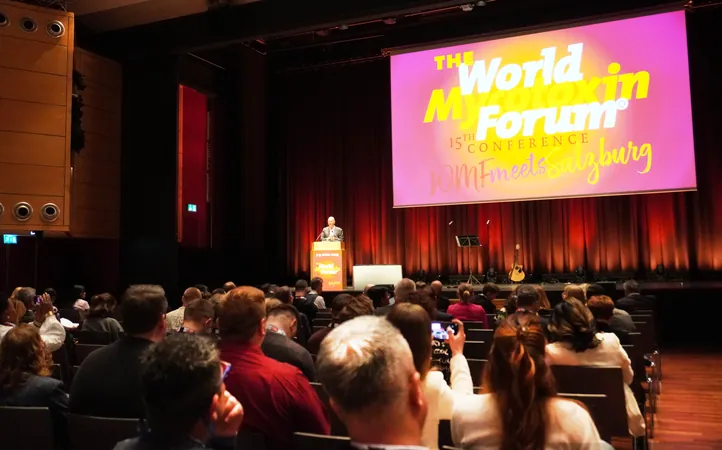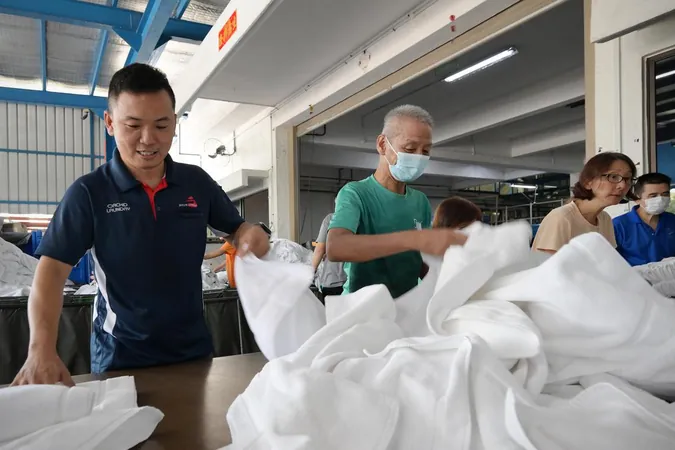
Unpacking Mycotoxins: The Intersection of AI, Climate Change, and Food Safety
2025-04-18
Author: Ming
Salzburg's Historic Gathering
In a breathtaking setting renowned for its rich cultural heritage, Salzburg, Austria, hosted the 15th World Mycotoxin Forum from April 7 to 9. Over 400 scientists, industry leaders, and policymakers converged to tackle pressing issues surrounding mycotoxins—the toxic compounds threatening our food systems.
A Harmonious Conference Kickoff
Kicking off with a unique musical twist, the forum welcomed participants with an enchanting cover of *Edelweiss*. This light-hearted moment set the stage for serious discussions on mycotoxins within the picturesque backdrop of the Mirabell Gardens.
Building Resilience in the Digital Era
The theme for this year's forum was "Building a Resilient Food and Feed System in the Digital Decade: Challenges for Mycotoxin Research and Management." Prof. Rudolf Krska from BOKU Vienna emphasized the significance of artificial intelligence in revolutionizing mycotoxin management, stating that the forum would delve into both its advantages and potential pitfalls.
AI: A Double-Edged Sword
The first keynote speaker, Prof. Thomas Hartung from Johns Hopkins University, boldly asserted that AI is reshaping everything. While it offers unprecedented productivity advantages, he cautioned of risks like data bias and plagiarism. "There's a wealth of data, but we must navigate the treasure trove carefully," he warned.
Machine Learning: Promise and Caution
Dr. Alan Inglis from Maynooth University explored AI's potential in detecting mycotoxins. Traditional methods may be reliable but slow. Machine Learning, he argued, provides quicker analyses but comes with its own caveats. He cautioned attendees about the dangers of overfitting models, stressing the need for robust validation in AI deployments to ensure credibility.
Climate Change: The Growing Threat
A critical theme that emerged was the undeniable impact of climate change on mycotoxin risks. Dr. Claudia Foerster from O’Higgins University highlighted how shifting climate patterns are exacerbating conditions conducive to fungal growth, leading to increased contamination in food supplies.
Aflatoxins on the Rise
With changing climatic conditions, regions like Chile, Argentina, and Uruguay face a troubling future, shifting from familiar Fusarium toxins to dangerous aflatoxins. Dr. Jog Raj highlighted the devastating effects of Aflatoxin B1 on livestock, underlining the urgent need for heightened awareness and preparedness.
Collaboration: The Path Forward
Overall, the overwhelming consensus at the forum was clear: combating mycotoxins necessitates collaboration. Prof. Chiara Dall’Asta stressed the importance of open data and joint research initiatives. Amidst extreme weather, geopolitical conflicts, and economic instability, food safety becomes a responsibility that transcends scientific innovation—it demands collective action.
A Reflective Conclusion
As the forum wrapped up, Prof. Michele Suman from Barilla posed an introspective question on what it truly means to belong to an interdisciplinary community. The World Mycotoxin Forum stands as a testament to the unity and shared purpose of those dedicated to addressing the complex challenges presented by mycotoxins in our food systems.


 Brasil (PT)
Brasil (PT)
 Canada (EN)
Canada (EN)
 Chile (ES)
Chile (ES)
 Česko (CS)
Česko (CS)
 대한민국 (KO)
대한민국 (KO)
 España (ES)
España (ES)
 France (FR)
France (FR)
 Hong Kong (EN)
Hong Kong (EN)
 Italia (IT)
Italia (IT)
 日本 (JA)
日本 (JA)
 Magyarország (HU)
Magyarország (HU)
 Norge (NO)
Norge (NO)
 Polska (PL)
Polska (PL)
 Schweiz (DE)
Schweiz (DE)
 Singapore (EN)
Singapore (EN)
 Sverige (SV)
Sverige (SV)
 Suomi (FI)
Suomi (FI)
 Türkiye (TR)
Türkiye (TR)
 الإمارات العربية المتحدة (AR)
الإمارات العربية المتحدة (AR)